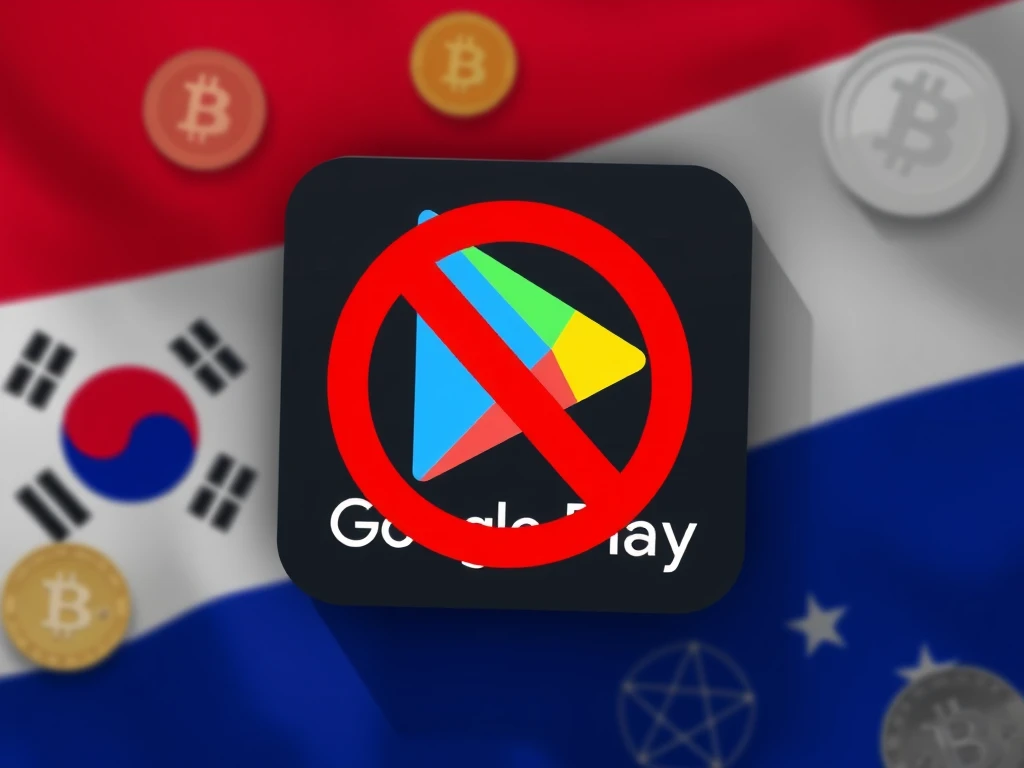Urgent: Google Play’s Drastic Ban on 17 Crypto Exchanges in South Korea

Heads up, crypto enthusiasts in South Korea! A major shakeup has just occurred as Google Play has implemented a significant block, restricting access to 17 unregistered exchanges operating within the country. This move, driven by South Korean regulators, is poised to have a ripple effect across the local cryptocurrency landscape. Let’s dive into what this means for you and the broader market.
Why is Google Play Blocking Crypto Exchanges in South Korea?
The driving force behind this decisive action is the South Korean government’s intensified efforts to tighten financial regulation within the cryptocurrency sector. Regulators, specifically the Financial Intelligence Unit (FIU) under the Financial Services Commission (FSC), are cracking down on unregistered exchanges to combat potential money laundering prevention and safeguard local users from potential financial harm.
Here’s a breakdown of the key events leading to this block:
- March 21: The FIU announced it was considering sanctions against Virtual Asset Service Providers (VASPs) failing to register with authorities as mandated by South Korea’s Specified Financial Information Act.
- Coordination with KCSC: The FIU collaborated with the Korea Communications Standards Commission (KCSC), the internet regulator, to explore avenues for blocking access to non-compliant exchanges.
- March 26: The FSC released a list of 22 unregistered exchanges, explicitly naming 17 platforms that have been blocked from the Google Play Store.
This block on Google Play effectively prevents new users from downloading the apps of these crypto exchanges South Korea and restricts existing users from receiving updates, significantly limiting their accessibility within the country.
Which Crypto Exchanges are Affected by the Google Play Block?
The FSC has publicly identified the 17 crypto exchanges South Korea now facing access restrictions on the Google Play Store. These platforms are:
| Exchange Name |
|---|
| KuCoin |
| MEXC |
| Phemex |
| XT.com |
| Biture |
| CoinW |
| CoinEX |
| ZoomEX |
| Poloniex |
| BTCC |
| DigiFinex |
| Pionex |
| Blofin |
| Apex Pro |
| CoinCatch |
| WEEX |
| BitMart |
If you are a user of any of these crypto exchanges South Korea, it’s crucial to be aware of these restrictions and consider the implications for your trading activities.
The Aim: Money Laundering Prevention and User Protection
South Korean regulators are clear about their objectives. By blocking access to unregistered exchanges, they aim to:
- Enhance Money Laundering Prevention: Unregistered platforms can pose a higher risk for illicit financial activities. By restricting their operations, authorities intend to curb potential money laundering prevention through crypto assets.
- Protect Local Users: Ensuring that crypto exchanges South Korea operate within a regulated framework is seen as vital for safeguarding users from potential damages, fraud, and lack of recourse in case of issues.
The FIU is also extending its efforts beyond Google Play, coordinating with Apple Korea and the KCSC to potentially block internet and App Store access to these platforms. This indicates a comprehensive approach to enforce regulatory compliance.
KuCoin’s Stance and Broader Industry Reactions
KuCoin, one of the exchanges on the blocked list, previously stated they are monitoring regulatory developments globally, including in South Korea, emphasizing the importance of compliance for sustainable crypto growth. However, specific plans for addressing the South Korean regulatory landscape remain unclear.
This crackdown is part of a broader trend of increased scrutiny on crypto exchanges South Korea. Recent events, such as raids on Bithumb offices related to alleged financial misconduct and reports of intermediaries facilitating token listings on major exchanges like Upbit and Bithumb, highlight the intensifying regulatory pressure within the South Korean crypto market.
Looking Ahead: What Does This Mean for the Future?
Google Play’s block on unregistered exchanges marks a significant escalation in South Korea’s regulatory approach to cryptocurrencies. It signals a clear message that operating within the legal framework is non-negotiable for crypto exchanges South Korea.
While the immediate impact is on the affected platforms and their users, this move could have wider implications for the global crypto regulatory landscape. Other jurisdictions may observe South Korea’s actions and consider similar measures to enhance consumer protection and combat financial crime within the digital asset space. For users in South Korea, it’s a strong reminder to prioritize regulated and compliant platforms for their crypto activities.









